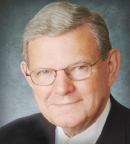Several of the researchersand scientists at the 42nd annual San Antonio Breast Cancer Symposium (SABCS), held December 10–14, attended the event on the basis of scholarships awarded through SABCS and its cosponsor, the American Association of Cancer Research (AACR). The goal of the scholarships is to encourage and aid early-career researchers in gaining wider recognition for their work.

Charles A. Coltman, MD, MMS

Arti Hurria, MD, FASCO
The scholarships were awarded to poster and spotlight session presenters. Recipients include those given the first-ever memorial scholarships for SABCS cofounder Charles A. Coltman, MD, MMS, and Arti Hurria, MD, FASCO. Dr. Hurria, who was scheduled to present at the 2018 SABCS, was killed in an auto collision before the conference. Dr. Coltman died during the 2018 symposium.
SABCS Basic Science Scholar Award Recipients
For laboratory-based investigators-in-training whose work focuses on the biology of breast cancer and preclinical models of its development and progression:
- Hemn Mohammadpour, PhD, Roswell Park Comprehensive Cancer Center, Buffalo, New York: B2 adrenergic receptor-mediated signaling regulates the immunosuppressive potential of myeloid-derived suppressor cells
- Ofir Cohen, PhD, Dana-Farber Cancer Institute, Boston: A joint atlas of single-cell and bulk RNA-seq in metastatic breast cancer allows inference of oncogenic and drug-resistant transcriptional programs in malignant cells and the tumor microenvironment
- Hakwoo Lee, University of British Columbia, Vancouver: Single-cell analysis of breast cancer metastasis using patient-derived xenograft model reveals clonal relationship between primary tumor and its metastases
- Shir Schlosser, Tel Aviv University, Israel: Risk of radiation-induced secondary malignancies in gBRCA carriers following breast cancer therapy
- Aatish Thennavan, University of North Carolina, Chapel Hill: Molecular signatures of DCIS to invasive progression for basal-like breast cancers: An integrated mouse model and human tumor study.
SABCS Clinical Scholar Award Recipients
For clinical scientists-in-training who are actively pursuing clinical or clinical/translational research in breast cancer.
- Kristen Carroll, Northwestern University, Robert H. Lurie Comprehensive Cancer Center, Chicago: Clinicopathologic and molecular features in young women with metastatic breast cancer
- Melissa Edwards, MB ChB, University of Auckland, New Zealand: The impact of breast cancer treatment concordance on survival in relation to comorbidity burden
- Kush Lohani, MD, All India Institute of Medical Sciences, New Delhi: Comparison of four techniques of clinical breast examination: A cross-sectional diagnostic test evaluation
- Veronica Mariotti, MD, Moffitt Cancer Center, Tampa, Florida: Results of a phase II double-blinded, randomized, placebo-controlled clinical trial of i ndoximod, an indoleamine-2,3-dioxygenase 1 (IDO1) inhibitor, in combination with taxane
- Natsuko Onishi, MD, PhD, University of California San Francisco: Lack of background parenchymal enhancement suppression in breast MRI during neoadjuvant chemotherapy may be associated with inferior treatment response in hormone receptor–positive breast cancer.
Coltman Scholar Award Recipients
In memory of Dr. Coltman to commemorate the significant contributions he made to oncology medicine. For clinical scientists-in-training.
- Mathilde Almekinders, MD, Netherlands Cancer Institute, Amsterdam: Impact of increased mammary adiposity on DCIS progression
- Alexandra Desnoyers, MD, Princess Margaret Cancer Ctr, Toronto: Fragility index of trials supporting approval of breast cancer drugs
- Joshua Drago, MD, Memorial Sloan Kettering Cancer Center, New York: Genomic profiling of primary and metastatic breast cancer in men
- Yash Huilgol, University of California San Francisco: Breast cancer risk thresholds as a predictor of chemoprevention uptake in the Athena Breast Health Network
- Nathalie LeVasseur, MD, BC Cancer, Vancouver, British Columbia: Impact of ER positivity on time and pattern of relapse in early-stage breast cancer patients.
Arti Hurria Travel Award Recipients
Created in memory of Dr. Hurria and in recognition of her commitment to the mentorship and training of the next generation of geriatric oncologists. For geriatric oncologists-in-training.
- Nicolò Matteo Luca Battisti, MD, PhD, The Royal Marsden NHS Foundation Trust, Sutton, United Kingdom: Use of systemic therapy for early-stage breast cancer in older adults: Results from the Bridging the Age Gap study
- Demetria Smith-Graziani, MD, The University of Texas MD Anderson Cancer Center, Houston: Delayed initiation of adjuvant chemotherapy in older women with breast cancer.
AACR Associate Award Merit Recipients
For presenters of meritorious abstracts who are Associate Members of the AACR.
- Yara Abdou, MD, Roswell Park Comprehensive Cancer Center, Buffalo, New York: Racial differences in infiltration of CD8+ T cells in breast tumors of Black and White women
- Kristin Altwegg, MS, University of Texas Health San Antonio: Development and characterization of a first-in-class small molecule inhibitor of PELP1
- Isaac Chan, MD, PhD, Johns Hopkins University, Baltimore: A dual role of natural killer cells in breast cancer metastasis
- Chi Gao, MS, Harvard T.H. Chan School of Public Health, Boston: Polygenic risk scores provide clinically meaningful risk stratification among women carrying moderate penetrance pathogenic variants in breast cancer predisposition genes: Results from the CARRIERS study
- Lorenzo Gerratana, MD, Northwestern University, Chicago: Liquid biopsy methods and machine learning modeling to understand organ tropism and metastasization behavior of metastatic breast cancer
- Sofia Mastoraki, PhD, The University of Texas MD Anderson Cancer Center, Houston: Assessment of intratumoral heterogeneity in early-stage estrogen receptor–positive breast cancer
- Rosalyn Sayaman, PhD, City of Hope, Duarte, California: Application of machine learning to elucidate the biology predicting response in the I-SPY 2 neoadjuvant breast cancer trial
- Alberto Servetto, MD, The University of Texas Southwestern Medical Center, Dallas: Fibroblast growth factor receptor 1 associates with promoters genome-wide and regulates gene transcription in ER+/FGFR1-amplified breast cancer: Implications for endocrine resistance
- Vrutant Shah, PhD, The University of Texas MD Anderson Cancer Center, Houston: A novel model to study to metaplastic TNBC
- Siddhartha Yadav, MD, Mayo Clinic, Rochester, Minnesota: Comparison of recommendations for germline genetic testing in an unselected cohort of patients with breast cancer.

